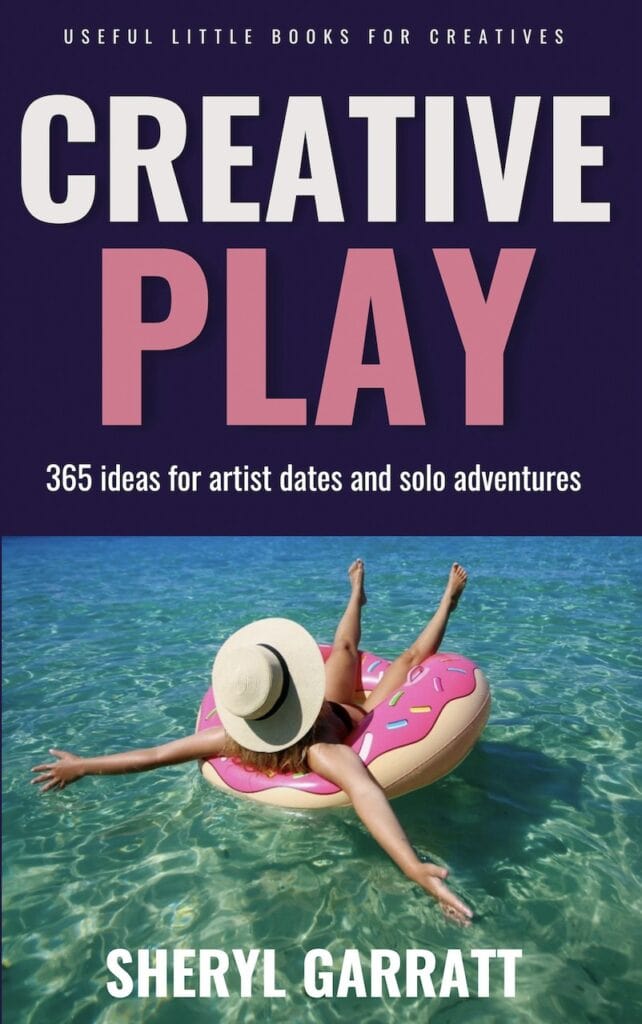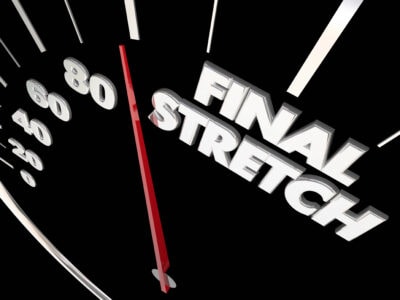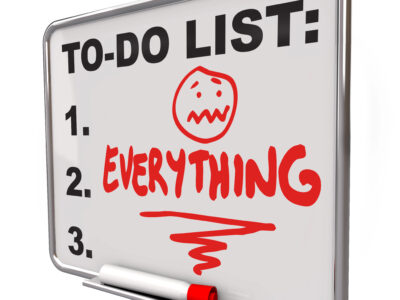“Unfinished projects can’t compound.” – James Clear
Why can’t I finish this?
This is a question that comes up a lot in coaching sessions. It also comes up a lot for me personally: I write it a lot in my daily journal.
When we think of creative blocks, we often focus on the things that prevent us from starting our creative work. But it’s important to also talk about finishing. Because that can be the scariest, hardest part of all.
You started strong. You waded through the messy middle, when the problems pile up and many creative projects are abandoned. And now you’re almost at the end.
You can see the finish line, you’re sprinting gleefully towards it.. and then you suddenly find yourself facing a brick wall, and you come to a screeching halt.
Or you can’t let go, and you find yourself tweaking and polishing, editing and over-dubbing until the whole thing is overworked and you’ve lost sight of why you wanted to make it in the first place.
Finishing can be terrifying.
You’ve been in problem-solving mode, in flow, absorbed in the work. But suddenly bigger, scarier questions come flooding in.
How do you know when it’s done? Is it good enough? Who will you be without this project defining you? What if no one likes it? Worse, what if no one even notices it? What will you do next? What if you fail? What might change if you succeed?
In the final stages of any big project, all of the demons and nasties we thought we’d defeated dress up in fancy new costumes and come dancing back into the room, fitting our feet with lead boots and suddenly making it hard to focus.
Fear, doubt. Perfectionism, procrastination. Exhaustion, overwhelm. And of course our charming but toxic companion, distraction.
They can be hard to recognise, in their new disguises.
- You might suddenly find yourself drowning in admin, urgent email, busywork.
- You keep finding other tasks that feel more pressing, or take on new commissions or projects.
- Shiny new ideas come crowding in, demanding your attention.
- You think of virtuous, valid-sounding reasons not to finish. Your children/partner/elderly parents need you, so you have to put them first. You don’t want to make your friends jealous – or for your new-found success/money/fame to come between you.
- Or you suddenly feel ill, exhausted, close to burnout. Every time you go to work on your project, it’s like a fog fills your brain.
Understand your enemy
All of us have to face this at some point. I’ve often felt I’m a couple of weeks from finishing a big project – then three months later find I’m still pretty much in the same place.
So here are some of the issues that might be blocking you. And some strategies to deal with them.
1. It’s not perfect
We hold ourselves to unbearably high standards. For many creatives, it’s our great taste that gets in the way. We compare our project to the work of the greats, and find ourselves lacking.
As a recovering perfectionist myself, all I can say is, the more you make, the better you get. And the only way you’ll make more is to let go of this one.
You lose control of your creations once they’re done. You don’t know which of your imperfect works will resonate with people. Which might open doors or lead to exciting new opportunities, years after you made them. Which will become a sudden, unexpected success and change everything. Or which will be totally misunderstood.
Even if it barely makes an impact at all, what you’ve created might be just what someone needs to see, read, hear right now. It might make them feel safe, seen, understood. It might cheer up a dull day, give them comfort, inspire them or give them a crucial bit of information they need. Who are you to deny it to them?
The solution: Perfect is subjective, elusive, impossible. Many works of art we now revere were reviled when they were first shown or performed. Accept that nothing you will do will ever be perfect, and put it out there anyway. Let it surprise you.
2. Fear is in the driving seat
Fear is a constant companion when you’re making creative work, and there’s no escaping it. You either give in to it, or you work with it.
We humans are excellent at assessing risk. At thinking of all the things that could go wrong if we do take action. But we rarely consider the cost of NOT taking action.
What will happen if you don’t take creative risks? What might you regret most: trying and failing, or never trying at all? How will you feel in 10, 20, 30 years if you don’t finish this project and put it out there?
The solution: Sit with the fear. Name it. Say it out loud. Allow yourself to feel whatever doubts you’re feeling. Then tell fear to shuffle back into the passenger seat. And you take the wheel.
3. You’re over-complicating it (again)
If creatives share one trait, it’s our tendency to complicate everything. In many ways, it’s our superpower. We have powerful imaginations so we grow things, embellish them, turn a simple task into an epic quest.
But sometimes, that client really doesn’t want a book, a palace, a ballgown. They just want the article they commissioned, a shed, a simple shift dress.
There’s nothing stopping you making the bigger, better version later. But it can be helpful to ask what the simplest possible version of this would be. The easiest way to satisfy both the client/audience and yourself.
The solution: Define your project. Decide what ‘done’ looks like, for this iteration. Set tight constraints, simplifying whatever you can. Then get on with it. You can always return to it and embellish it later.
4. No one is waiting for what you’ve made
It can be hard letting go of a project when you don’t know it will find an audience. When there are no eager fans waiting. No advance orders.
Once you have finished, there’s often a whole new mountain to climb: marketing it, sharing it, building an audience for it, finding the right outlets. That can feel daunting.
The solution? Create your own deadlines and milestones. Create some gentle pressure by telling people the work is coming. If you have a platform, a mailing list, a fanbase, start sharing news about it. Talk about how and why you made it. If you don’t have any of that, tell friends and colleagues. Get support. Use a buddy or coach to keep you accountable, if needs be.
5. You’re trying to do too much at once
Maybe you’re that one exceptional human who can multitask. Who can finish your book while searching for an agent; who can record new songs while discussing album artwork and tour dates; who can sell your work to retailers even though even you’ve only made a few rough samples.
More likely, you’re kidding yourself, and engaging in busywork. You’re time-travelling into the future, rather than focussing on your present task: finishing.
Even if you do find the perfect agent, manager, gallery or outlet, there’s little point if you have nothing to show them.
The solution: Stay present. Block out some distraction-free time and get your project done. Then work out what to do with it, and look for the team, the tools, the information you need. Your audience, your champions, your clients will be easier to find when you’re ready and actually have something to show or sell.
6. It’s all got too big and heavy
You started this project playfully, and full of joy. But somewhere along the line, it all became too serious.
You’ve loaded it with expectations. This project needs to change your life. In fact it needs to change the lives of everyone who reads it, hears it, sees it, wears it, uses it. It needs to earn lots of money, make you famous, turn your career in a new direction. It’s carrying such a heavy load, you’re struggling.
The solution: Lighten up. Find your joy and play again.
- If you’re stuck, brainstorm solutions. Come up with ten ideas a day, every day for a week. Write them all down: the absurd ones, the impossible ones, the ones that make you laugh out loud and the ones that are boring and the ones that are utterly stupid. Then choose one and do it.
- Go on a play date (or three). Stop pushing, and trust that the solution will come, if you keep turning up to do the work playfully, and full of curiosity.
- Lower the stakes. You can’t control how something will be received. You can only control whether you finish it, show it, share it. Remind yourself that it takes time to create a body of work. And this project is just one of many.
7. There really is something missing
Underneath that chorus of critical voices telling you that nothing you do has any value, there’s another, quieter, kinder inner voice that is far smarter, and often far more specific. Tune into it, and see what it’s saying. (If you can’t hear it at all, this Inner critic/inner mentor workshop recording will help.)
Is there something missing, something wrong, something you need to know/do about this project? Is your intuition, your experience trying to tell you something?
Journal. Meditate. Go for a walk. Do whatever connects you to that deep inner knowing. Listen carefully. Feel it in your body.
Decide whether it’s fear talking, or something more useful. Then take a pause before deciding what action to take. Especially if you’re tempted to tear it all up and start again.
Often, it’s something small: the title, the cover, a specific section or detail. Change that, and you realise you’re finally ready to let go.
And to start again, on something new.
A book to help you play more (and work better)

Making time to play, explore, try new things without needing it to yield an immediate result is a key part of any creative practice.
When you’re self-employed or on a deadline, it can also be the part you neglect!
This short, practical book explains why you might need to bring more play into your life and work – with 365 ideas to start you off.
This is for you if:
- Your creative work is feeling grey, uninspired, heavy and difficult.
- You’ve read Julia Cameron’s book The Artist’s Way but never found time for the Artist Dates (or you couldn’t think what to do).
- You want to bring more playfulness into your life.
- You’ve lost touch with your creativity and you want to come back to it.
- It’s been a long, long time since you’ve given yourself a break.
It will help you get into flow more easily, step back and see what’s important, feel more inspired and alive – and just have more fun!
Available now from Amazon, at £8.99 (paperback) or £5.99 (Kindle). I appreciate that not everyone wants to use Amazon, so you can also buy the e-book directly from me if you’d prefer.






What do you think?